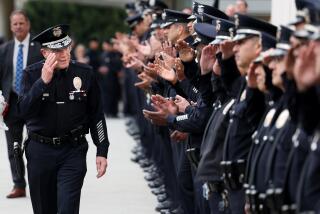LAPD commanders’ personal information posted on website
Personal information about more than two dozen members of the Los Angeles Police Department’s command staff was anonymously posted on a website, officials said Wednesday.
The LAPD is investigating who may be behind the site, which listed officers’ property records, campaign contributions, biographical information and, in a few cases, the names of children and other family members.
In the last few months, hackers have tried to break into the servers of several public agencies including the LAPD, the Fullerton Police Department and the Bay Area Rapid Transit system.
Department officials said it appeared that the information was gleaned from public records, and there was no evidence that the LAPD’s computer records had been breached.
The information was posted on a site that allows users to anonymously input data. This type of site has increasingly been used to post personal information of individuals who raise the ire of online activists. The practice is known as “doxing.”
For much of Wednesday, most of the links to the site could not be accessed, but the information reappeared on a separate website late in the day.
LAPD Cmdr. Andy Smith said the department could not move to shut the site down because officials could not prove the data was illegally obtained.
“It’s a creepy thing to do, but what they did doesn’t appear to be against the law,” Smith said.
Several postings were linked to from a publicly available Twitter account, where unnamed activists claimed responsibility for the document dump. Some of the posts reference the shadowy computer hacking group “Anonymous” as well as Occupy L.A., but no specific links to either could be established.
“We stand with OccupyLA,” one of the postings reads. Another message refers to posted documents related to the Denver and Philadelphia police departments.
Los Angeles police say there has been a recent uptick in attempts to hack into the department’s computers and website. None have been successful.
Sgt. Frank Preciado, who oversees the LAPD’s online unit, said most of the attacks on department servers have come in the form of attempts to hack into, slow or lock up the department’s public website. As for personal information, Preciado said computer hackers “would find zero other than names and email addresses.”
Members of Anonymous advocate for civil disobedience by hacking into computer systems and releasing private and classified information.
Anonymous posted an online video listing the personal contact information — including the home address, home telephone and cellphone numbers and email address — of the UC Davis officer who used pepper spray on students last month.
In the video, the mysterious group directly addresses the officer, telling him to “expect our wrath” and threatening, “We are going to make you squeal,” as footage of him dousing passive protesters is seen in the background.
Smith said the LAPD has warned officers to be careful about any personal information that they make available in the public domain, but such breaches represent a safety issue for all law enforcement.
“Of course there are concerns when officers’ private information is disseminated on public websites,” Smith said. “Part of our business is putting bad guys in jail, and they don’t need to know personal information about our officers. We are very concerned for the safety of our officers and their families.”
More to Read
Sign up for Essential California
The most important California stories and recommendations in your inbox every morning.
You may occasionally receive promotional content from the Los Angeles Times.










